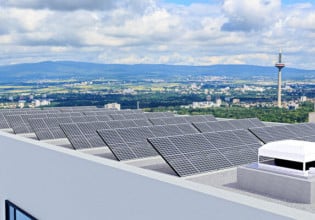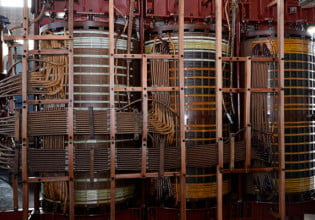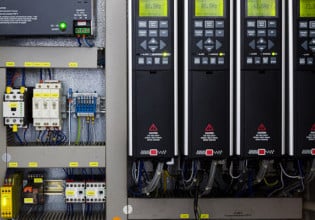Solar Recycler Wants To Close the Loop in Supply Chain
SOLARCYCLE will recycle used solar panels from EDF Renewables' facilities and repurpose the recovered materials to make new solar components.
When a solar panel becomes damaged or broken, it will likely end up in a landfill. While only 10 to 15 percent of used panels are recycled, California-based EDF Renewables and SOLARCYCLE are teaming up to change that. They plan to create a closed-loop supply chain that recycles solar panels and uses the recovered materials for next-generation solar manufacturing.
Solar panels awaiting recycling. Image used courtesy of SOLARCYCLE
SOLARCYCLE uses a recycling process it claims can extract 95% of the value of recycled panels, including core ingredients like silver, silicon, aluminum, copper, and glass. At its advanced recycling facility in Texas, the company recycles end-of-life systems and parts broken during installation or damaged due to weather, wear and tear, or warranty failure.
SOLARCYCLE will recycle materials from EDF Renewables’ grid-scale, distribution-scale, and on-site solar installations, which serve utility, commercial, and industrial customers.
Recycling Methods for Solar Panels
Generally, there are two methods to recycle solar panels. In the case of crystalline silicon systems, which account for over 90% of the modules sold today, aluminum and glass can be separated and individually recycled. The remaining modules are put through a thermal processing unit to ease the bonds between the elements and evaporate the plastic. A melting process separates the hardware from the silicon particles, which can be reused in new modules.
In thin-film-based solar cell recycling, machines shred the panels into tiny millimeter-sized pieces, and a rotating screw separates the solid and liquid materials. The liquids are purified through precipitation and separated from the semiconductor materials through a metal processor. The contaminated solid materials, containing inter-layers, are then removed and separated using a vibrating surface. A rinsing process recovers pure glass for use in future solar panels.
Video used courtesy of SOLARCYCLE
SOLARCYCLE’s Technology
SOLARCYCLE can recover almost all (95%) of the value of decommissioned solar panels, beating the typical industry standard yield of 90% or less. The company touts a comprehensive system covering the module frame and all remaining components.
Companies send damaged or retired solar panels to SOLARCYCLE’s Texas facility. Staff evaluate whether they can be reused secondhand on-site. If not, the parts are run through advanced recycling machines that remove the aluminum frame and junction box and delaminate the glass.
Shredding machines then transform the remaining panel material into tiny pieces. The plastic is separated, and a material recovery process sifts for high-value metals like silver and copper.
SOLARCYCLE then returns the materials to domestic solar manufacturers or other industries needing raw materials. The company also provides advanced tracking and reporting covering the number of panels recycled, pounds of material diverted from landfills, and greenhouse gas benefits.
By the end of 2023, SOLARCYCLE aims to have enough capacity to recycle 1 million solar panels annually. In 2024, it plans to open a vertically integrated advanced recycling factory capable of processing millions of units annually.
It’s also developing new refinement processes to improve its recovery and separation of metals and other materials for reuse in domestic solar production. Earlier this year, it received a $1.5 million Department of Energy (DOE) grant to research ways to recover high-purity materials from end-of-life solar panels. It’s developing a mechanical method to concentrate the materials, followed by an environmentally friendly chemical recovery process.
Average composition and recycling yields of crystalline silicon modules, according to a 2022 literature review. Image used courtesy of Energies (Creative Commons Attribution 4.0)
Environmental Benefits of Closed-Loop Recycling
By repurposing end-of-life modules and cells into new components, solar panel recycling reduces developers’ critical material demands and establishes a more resilient supply chain, avoiding costly mining operations.
Most photovoltaic (PV) panels have a lifespan of 25 to 30 years. About 99% of module materials are non-hazardous, and 95% are recyclable. According to the Solar Energy Industries Association, 80% of solar panels’ weight is glass and aluminum, which are typically easy to recycle by separating the pieces after dismantling the rest of the system. Other recoverable ingredients include copper, silver, and semiconductor materials.
Only about 10% of solar panels are recycled in the U.S. today, and this number is projected to grow significantly as solar deployments expand across the country. While more than 75% of America’s PV capacity was installed in the last five years, some parts are already entering local landfills due to weather damage or manufacturing defects. The DOE estimates end-of-life components could account for up to 12% of municipal electronic waste volume by 2050.
After facing supply chain shocks from the pandemic and global instability, solar developers are rethinking their sourcing strategies and moving away from volatile mining operations. Today’s recycled panels will be used in tomorrow's systems. Modeling from the National Renewable Energy Laboratory indicates that end-of-life material has the technical potential to supply up to 30% of the demand for silicon, silver, and aluminum in the energy transition after 2040.
Recycling Programs Ramp Up
EDF Renewables North America, a subsidiary of France-based EDF Group, isn’t the only solar giant using SOLARCYCLE’s services. The company recently partnered with AES Corporation, one of the U.S.’s largest solar asset owners, on a pilot program to assess current and future recycling needs, including processing decommissioned panels at the Texas facility and sending materials to domestic off-takers, including local companies.
Renewable energy developer Ørsted teamed up with SOLARCYCLE earlier this year to process and recycle end-of-life modules from its U.S. projects. The agreement serves Ørsted’s crystalline silicon solar modules, building on its existing thin-film module recycling contract with Arizona-based First Solar.
First Solar runs an in-house process supporting a closed-loop supply chain. The company’s website states that its modules are designed for maximum end-of-life material recovery, allowing more than 90% of materials to be reused in new solar panels, aluminum, rubber, and glass products.








